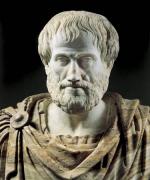|
This section contains 6,693 words (approx. 23 pages at 300 words per page) |

|
SOURCE: "The Rationality of Political Speech: An Interpretion of Aristotle's Rhetoric," in Interpretation: A Journal of Political Philosophy, Vol. 9, Nos. 2 & 3, September, 1981, pp. 141-54.
In the following essay, Arnhart maintains that Aristotle uses the concept of enthymeme (a logical argument, or syllogism, in which one of two conclusion-supporting premises is unexpressed) to defend the legitimacy of rhetorical discourse and to distinguish rhetoric from both science and sophistry.
I
Is rhetoric some form of rational discourse about the intelligible reality of politics? Or is it merely a means for verbally manipulating men through fallacious arguments and appeals to irrational impulses? In short, can rhetoric be distinguished from sophistry?
One might say that the rhetorician—by his use of public speech to interpret, evaluate, and deliberate about political action—maintains somehow the rule of reason in political affairs. Does not rhetoric require political men to talk about and thereby to think...
|
This section contains 6,693 words (approx. 23 pages at 300 words per page) |

|


